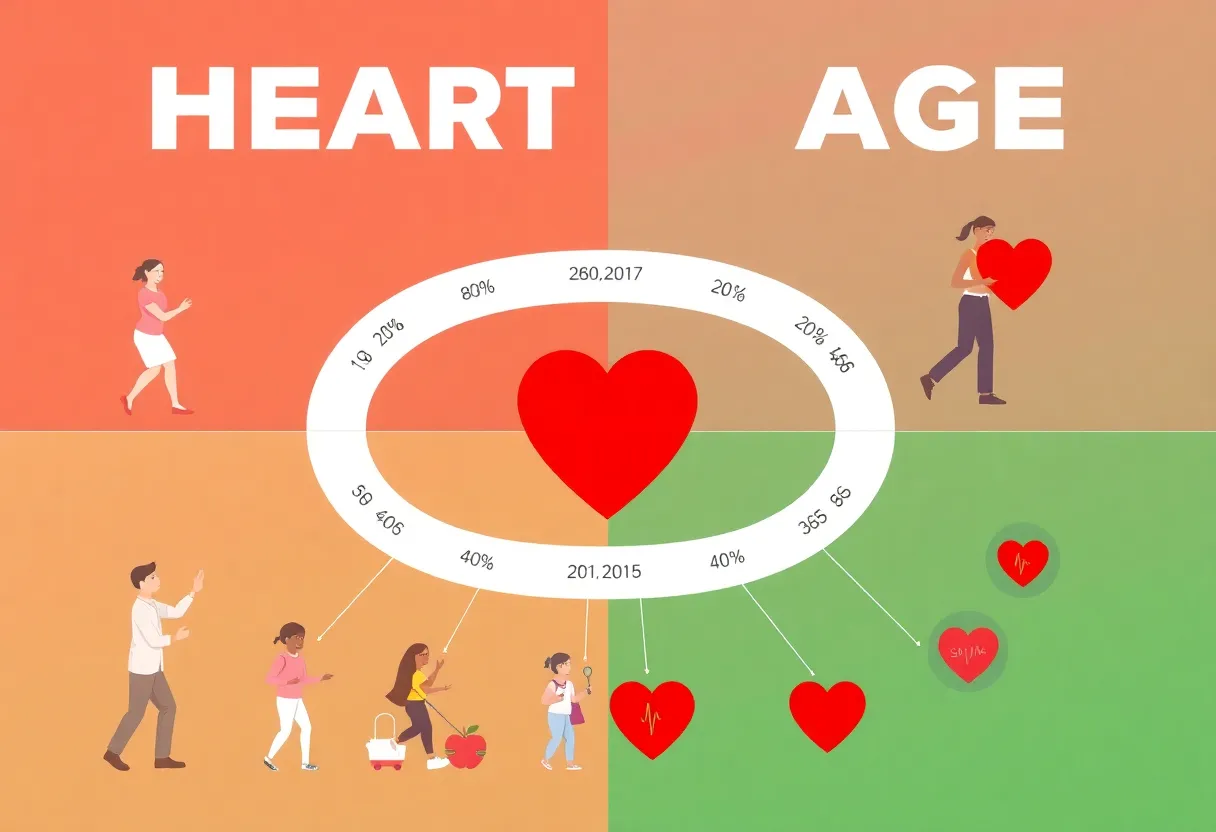News Summary
A recent study from Northwestern Medicine shows many U.S. adults have a ‘heart age’ significantly older than their chronological age, especially among men and those with lower income and education levels. Researchers developed a heart age calculator to help individuals understand their risk for heart disease, highlighting concerning trends in educational and racial disparities. The findings emphasize the importance of cardiovascular health awareness and preventive care.
Chicago – A new study conducted by researchers at Northwestern Medicine indicates that a significant number of U.S. adults have a “heart age” that is several years older than their actual age, with some individuals exhibiting differences of more than ten years. The disparities are particularly notable among men, individuals with lower income and education levels, and those identifying as Black or Hispanic.
Northwestern scientists developed a free online tool that enables users to calculate their “heart age” by assessing various cardiovascular disease risk factors, which include blood pressure, cholesterol levels, smoking habits, and diabetes status. Although the calculator provides valuable insight, it is intended to complement clinical evaluations rather than replace professional medical advice. The findings of this study are scheduled for publication in JAMA Cardiology on July 30, 2025.
The heart age calculator is designed to help individuals understand their risk for heart disease by converting complex medical data into a more relatable form. Traditionally, heart disease risk is represented as a percentage, which can be challenging for patients to grasp. The researchers believe that presenting this risk as an “age” will enhance communication between healthcare providers and patients regarding potential preventive measures.
In their research, the team analyzed data from over 14,000 U.S. adults aged between 30 and 79 years, gathered from the National Health and Nutrition Examination Survey conducted between 2011 and 2020. All participants were free from any prior history of cardiovascular disease. The results revealed that women, on average, possess a heart age of 55.4 years while their actual chronological age stands at 51.3 years. Men, on the other hand, show an average heart age of 56.7 years compared to a chronological age of 49.7 years.
The study uncovered troubling trends concerning educational and racial disparities. Approximately one-third of men with a high school education or less had a heart age exceeding ten years older than their actual age. Furthermore, the age gap is most pronounced within Black and Hispanic communities; Black men have an average heart age 8.5 years older than their chronological age, while Black women experience a discrepancy of 6.2 years. Among Hispanic adults, men have a heart age 7.9 years older, and women show a gap of 4.8 years. For comparison, white men and women have heart ages averaging 6.4 years and 3.7 years older than their chronological ages respectively, while Asian men and women present heart ages older by 6.7 years and 2.8 years.
Heart disease continues to be the leading cause of death in the United States, despite ongoing improvements in public health initiatives. The research reveals a concerning trend: many adults are not receiving essential preventive care. This study underscores the importance of awareness and the need to encourage individuals to pay attention to their cardiovascular health.
Dr. Sadiya Khan, the study’s lead author, expressed hope that the heart age calculator will empower individuals, especially among younger populations, to recognize their heart disease risk and motivate them to pursue preventive actions. Future research aims to determine whether presenting cardiovascular risk in terms of heart age improves patients’ understanding of preventive therapies and medical outcomes.
The study is entitled “PREVENT Risk Age Equations and Population Distribution in US Adults” and marks a crucial step towards changing the conversation surrounding cardiovascular risk and enhancing the tools available for individuals to better understand their health.
Deeper Dive: News & Info About This Topic
HERE Resources
Study Warns of Bacteria in Reusable Water Bottles
Coca-Cola Shifts to Real Cane Sugar in U.S. Beverages
Connecticut Advocates for National Mesothelioma Registry for Veterans
New Jersey Woman Hospitalized Due to Turmeric Supplement Overdose
Additional Resources
- The Washington Post: Heart Biological Age and Cardiovascular Disease
- STAT: Most Americans’ Hearts Older than Chronological Age
- Medical Xpress: Adults’ Hearts Older than Actual Age
- Today: Heart Age Study and Calculator
- BuzzFeed: Heart Cardiovascular Age
- Wikipedia: Heart Disease
- Google Search: Cardiovascular Disease
- Google Scholar: Heart Age Calculator
- Encyclopedia Britannica: Heart
- Google News: Heart Disease
Author: STAFF HERE LOS ANGELES WRITER
The LOS ANGELES STAFF WRITER represents the experienced team at HERELosAngeles.com, your go-to source for actionable local news and information in Los Angeles, Los Angeles County, and beyond, specializing in "news you can use" with coverage of product reviews for personal and business needs, local business directories, politics, real estate trends, neighborhood insights, and state news affecting the area—with deep expertise from years of dedicated reporting and strong community input, including local press releases and business updates, while delivering top reporting on high-value events like the Academy Awards, LA Auto Show, and Los Angeles Marathon, extending coverage to key organizations such as the Los Angeles Area Chamber of Commerce and the Los Angeles Tourism & Convention Board, plus leading businesses in entertainment and technology like Warner Bros. and SpaceX, and as part of the broader HERE network including HEREAnaheim.com , HERECostaMesa.com , HEREHuntingtonBeach.com , and HERESantaAna.com , providing comprehensive, credible insights into Southern California's dynamic landscape. HERE Anaheim HERE Beverly Hills HERE Coronado HERE Costa Mesa HERE Hollywood HERE Huntington Beach HERE Long Beach HERE Los Angeles HERE Mission Viejo HERE San Diego HERE Santa Ana





